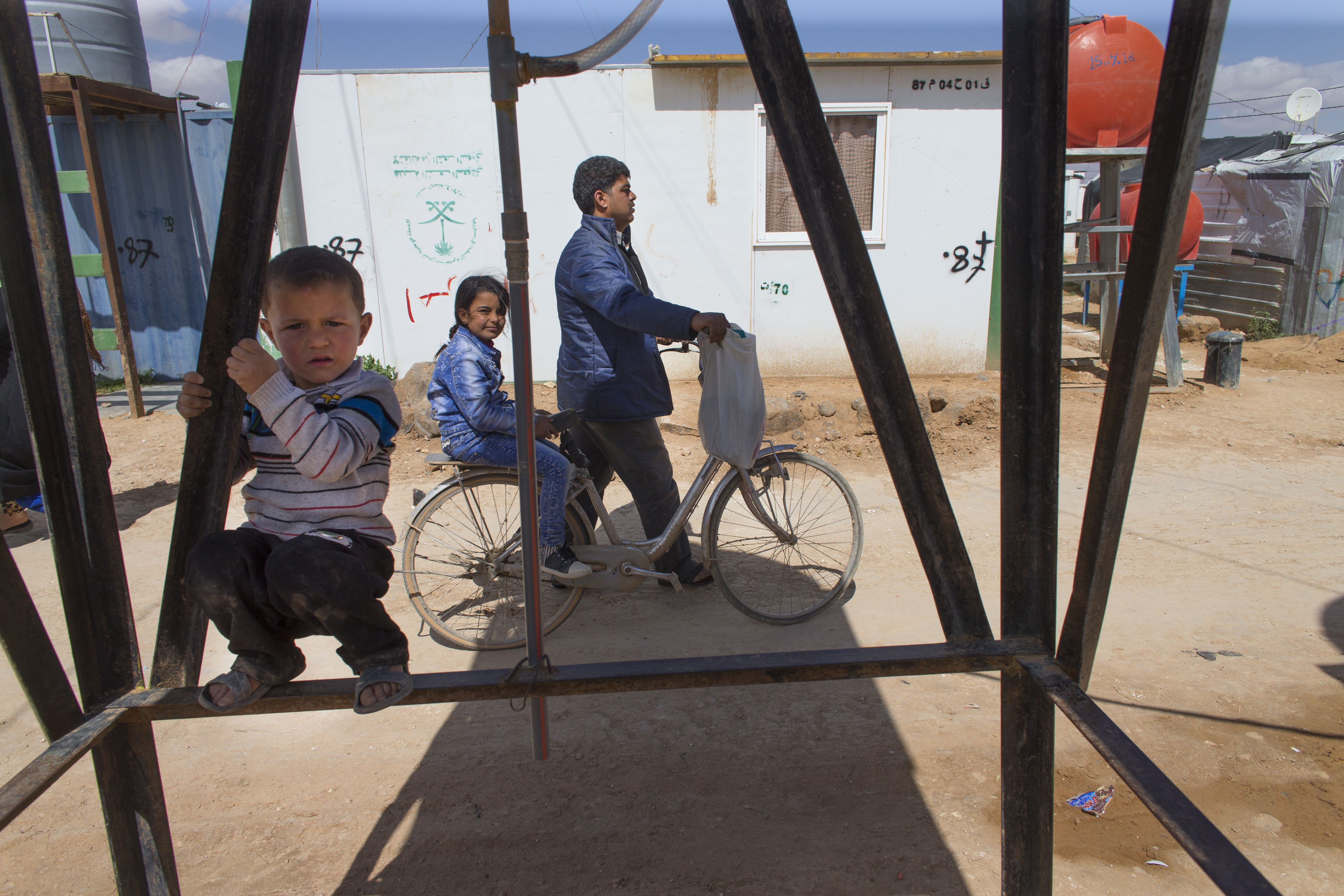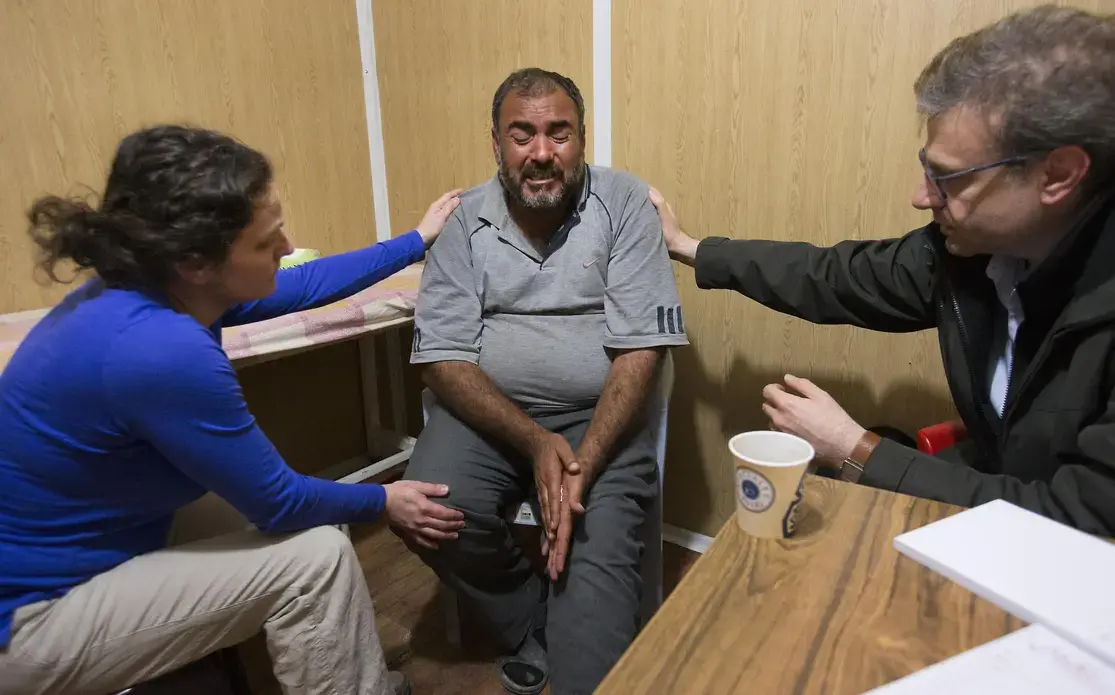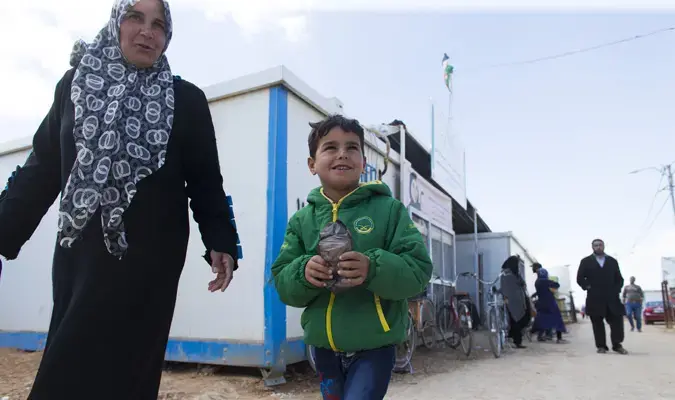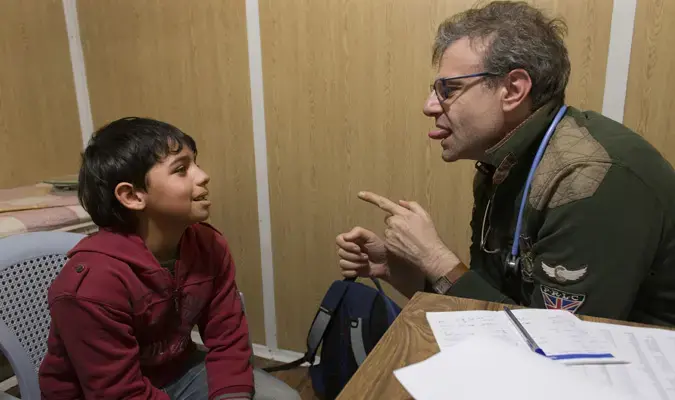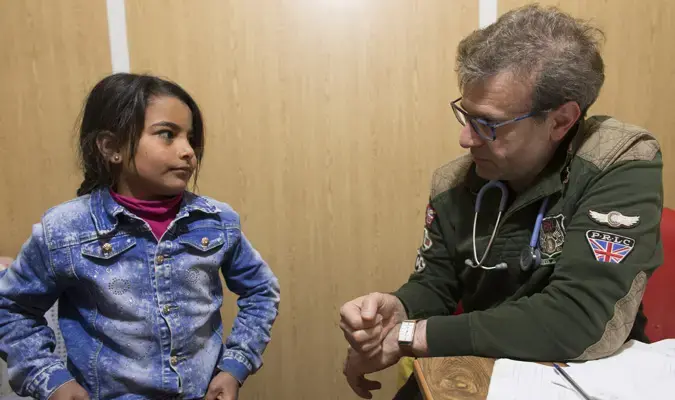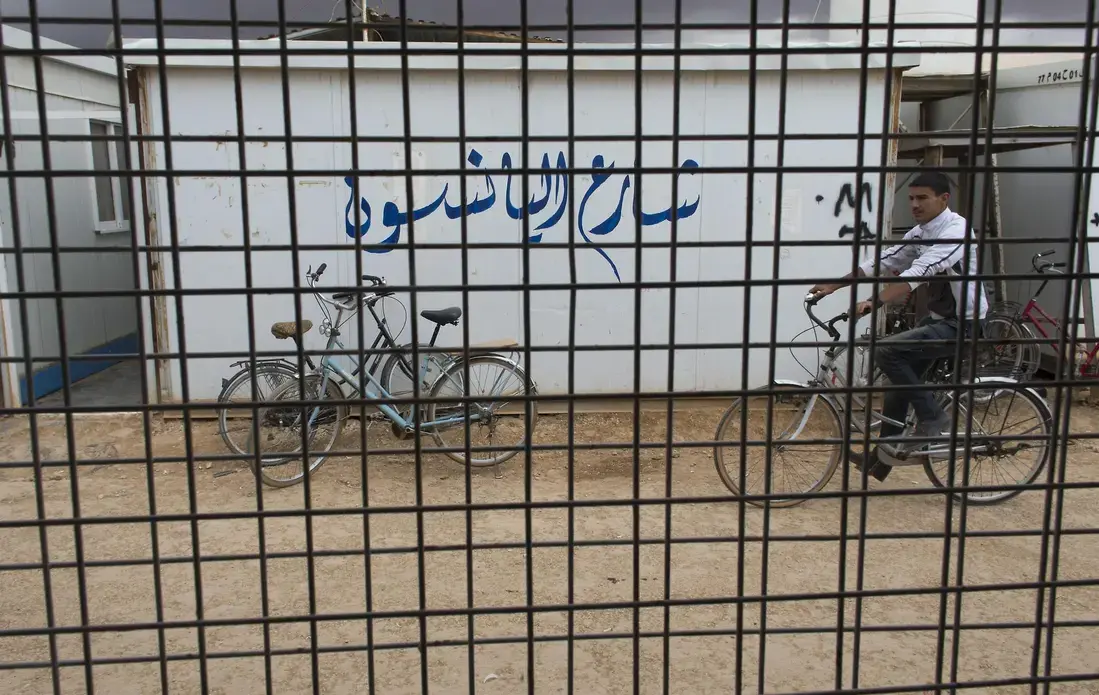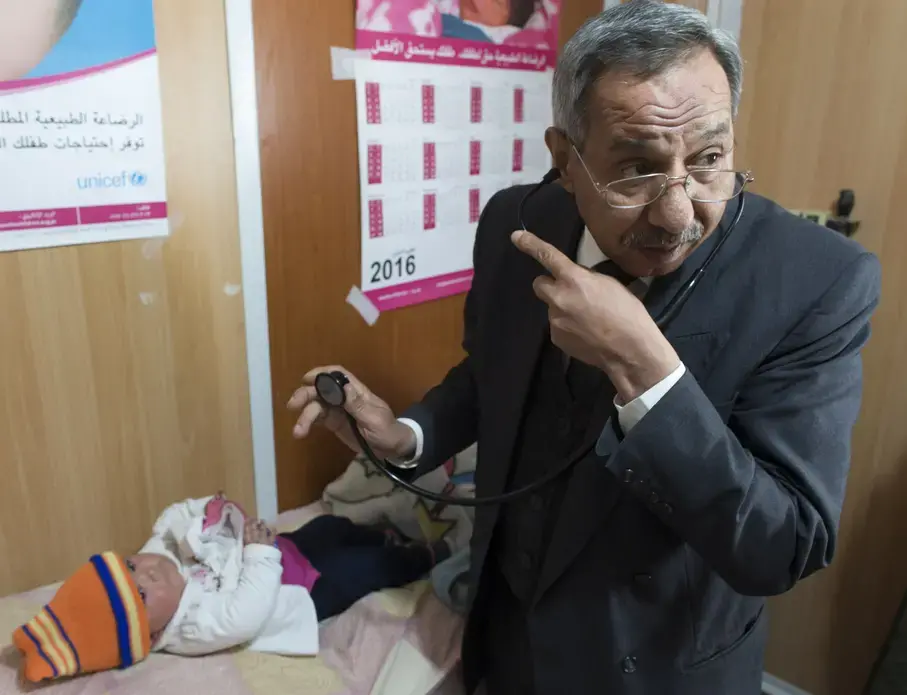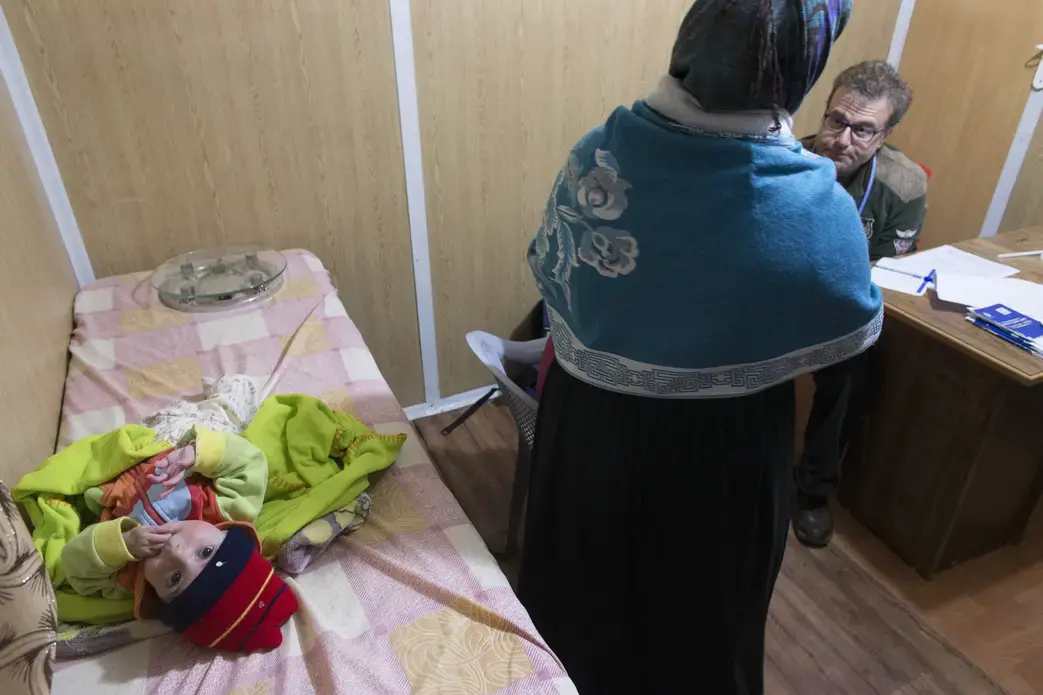Second installment of a three-part series published in the Milwaukee Journal-Sentinel by Pulitzer Center grantees Mark Johnson and Mark Hoffman.
ZAATARI REFUGEE CAMP, JORDAN — The noon call to prayer drifts through the Zaatari refugee camp, and still the patients keep filing into Tarif Bakdash's cramped examination room. The doctor will have to wait to worship.
First, he sees 6-year-old Omar, rescued after an explosion left him buried in the rubble of the family's home in Syria. His mother cannot afford the medicine that makes his seizures better.
The doctor then examines 11-year-old Yazan, who survived weeks of bombing in the Syrian city of Daraa without suffering physical injury, but saw others lose arms and legs. The boy now has headaches all the time, one of the physical symptoms of post-traumatic stress disorder.
And then there is 8-year-old Sandy Al Mekdad, who has beautiful, long black hair and a condition that will leave her paralyzed if she does not have surgery. It is the one crisis from which her father, Mahmood Al Mekdad, can find no deliverance.
When a bomb landed on their home in Daraa, forcing mother, father and three children to flee, covered in dust and rubble, "it was only God that saved us," Mekdad says. Speaking through a translator, the father expresses only gratitude for the small prefab dwelling in Jordan where the five of them now live: "Thank God," he says, for the camp.
"The challenge is my daughter. I cannot find a solution for her at all."
Father and daughter arrived at the clinic, run by the nonprofit Syrian American Medical Society, at 5:30 on this March morning, 21/2 hours before the doors opened. They'd heard about the doctors and nurses from America who would be working at the camp for the next four days.
Bakdash, who was born and raised in Syria, smiles at the girl and shakes her small hand. Then he examines a large cyst sprouting from her spinal cord. She has an abnormal stretching of the spine, a condition known as a tethered spinal cord. She is losing control of her bladder and bowels.
The doctor has her walk back and forth on her toes, then on her heels. She wobbles, and laughs self-consciously. Bakdash watches, his face serious.
"We have to find a way to bring her to the United States on a humanitarian visa," he says, knowing what a long shot it would be.
Immigration experts say a refugee child can be brought to the United States for emergency medical treatment under "humanitarian parole," a designation granted only in extraordinary circumstances. Even then, a hospital willing to treat the child must be found, and travel and other logistics arranged.
Of the millions of Syrian refugees, about 13 per year have received humanitarian parole.
Bakdash can do nothing more for the little girl on this day. Mekdad thanks the doctor and helps his daughter onto the back of their bicycle to go home.
The morning rush lets up around 1:30 in the afternoon. Bakdash packs away his stethoscope and crosses the narrow street to a small, tin building. He enters and prostrates himself on a rug facing Mecca to perform the noon prayer.
The tin room, known as a caravan, is the dominant feature of the camp's geography, the basic unit of housing for the refugees who have come here fleeing Syria's civil war. Caravans stretch as far as the eye can see, organizing Zaatari's 80,000 residents, a city the size of Racine, into a crude network of dirt streets.
The doctor's patients this day reflect another feature of the camp: its psychic landscape.
The weariness on the face of the girl's father, Omar's flat, joyless expression — they are visible signs of the traumatic stress that runs through the camp like a river.
•••
Zaatari is a microcosm of the worst human migration crisis since World War II.
Packed into those two square miles northeast of Amman, Zaatari's residents are but a fraction of the 651,000 refugees who've fled from Syria into Jordan since the war began.
And all of the refugees in Jordan are but a fraction of the 4.8 million Syrians dispersed all over the world by the fighting.
In five years, Syria has lost about 22% of its population. Imagine a segment of the American population roughly equivalent to the Midwest crossing the border into Canada with many journeying all the way on to Europe.
Another way to think of it: If Zaatari is a city, then the total number of Syrian refugees is a country — one with more people than the nation of Ireland.
And the millions of refugees, they are the fortunate ones.
Some 470,000 of their countrymen have been killed in the civil war, which is why so many of the children in the camp have no father, or a dead sister or brother, or dead aunts, uncles and cousins.
•••
The team of doctors and nurses who have come from Wisconsin to help out at the clinic in Zaatari find the practice of medicine there familiar in some respects, strange in others.
Thomas Chelimsky, a Froedtert Hospital neurologist, examines patients with serious spinal cord injuries caused by bullets — injuries he comes across sometimes in Milwaukee.
"The only thing I could do was tell them they were not going to walk again," he says. "No one had told them that."
The prognosis, a simple statement of fact in Chelimsky's experience, poses a problem. The interpreter is reluctant to translate Chelimsky's words into Arabic for the patient.
"I think they felt they shouldn't give patients bad news," he says.
Stacey Volkman, a Froedtert social worker, has a similar experience in the clinic's emergency room for women and children.
"One of the interpreters," she says, "told me, 'Don't talk about what happened in Syria. Talk to them about the stress of what's happening in the camp.'"
This makes little sense to Volkman. She knows from experience how much past trauma shapes us in the present.
Her empathy — the way she hugs the refugees and holds them as they pour out their troubles — comes from a chapter in her own life, a terrible car accident she survived when she was 16. It comes from the seven days she spent in a coma, the 30 days in the hospital, the months of learning how to walk again, and the longing through it all to have life return to normal.
In Zaatari, Volkman responds to the differences of language and attitude in the only way she knows.
"The universal language of compassion," she says. "Half the time I didn't know why the women were crying. I just went up to them and hugged them.
"And from the strength with which they hugged me back, I could feel their burden."
•••
At the end of that first day, the team's van is ready to leave.
A swarm of children descends on the visitors. The children jump to give high-fives. They invent their own games. One hides a small ring in the jacket pocket of a nurse; the other children try to find it.
Boys and girls surround a photographer, pleading for a turn with his camera.
As the doctors and nurses pile into the van, children try to sneak inside. As the van pulls away, they ride on the back, ducking so that the driver cannot see them.
Jennifer Nitschke-Thomas, one of two nurses on the mission, calls out to the children, using a word she has learned in Arabic: "Boukrah! Boukrah!"
Tomorrow. Tomorrow.
•••
At night, Bakdash guides his recruits through Amman.
He shows them where to find the warmest, freshest bread, the creamiest hummus, the chunkiest baba ganoush and the sweetest Middle Eastern desserts. He encourages them to try a puff from the fruit-scented hookah.
One night, after dinner, he suggests they start walking toward the hotel to work off their meal. When they tire, they'll grab a cab. But the doctor turns out to have only a hazy notion of where they are, so they wander in a great circle. Finally, after a series of wrong turns and failed attempts to get directions, after two hours of laughter and wandering, they arrive at the hotel, exhausted.
The shared adventures in Amman bond the members of the mission, even as they underline something disturbing. Nights in the affluence of the capital are followed by days in the poverty of the camp.
"I was really struck by the two societies," Chelimsky would recall weeks later. "You cross that wall (into the camp) and you're in a society of expatriates. I think the right word is exiles. They can't go back to their country, and in Jordan they are second-class citizens."
The refugees lack jobs. They must apply for permission to take a vacation outside the camp. The children have little to do, the parents little money. The boredom is suffocating.
•••
In the absence of things to do, refugees return often to the horrors they lived through in Syria.
In the clinic's emergency room, a woman talks of her 11-year-old son who witnessed the bombing of their neighborhood and the destruction of their home in the city of Nawa. Now he urinates on himself. He is afraid at night.
One of Chelimsky's patients is a middle-aged woman who has lost almost all of her male relatives to the civil war.
"How do you go on?" the doctor asks.
"I'm just waiting for a better day," she says.
Across the hallway, a 44-year-old man slumps in a chair facing Bakdash and almost immediately begins to weep. The man explains that he used to sell fruits and vegetables in Syria. Then security forces checked his ID and saw that he came from Daraa, a city identified with anti-government protests. He was arrested and tortured.
Each time the man tries to catch his breath, he's overcome, his bearded face convulsing in sobs. Volkman keeps hugging him and holding his hand, unconcerned that he is being treated for scabies.
"I want people to love each other," the man says. "Nothing more."
•••
Amid the noise and bustle of the clinic, one figure stands out each day, a short man who always dresses in a dark three-piece suit and tie, his mustached face soft and calm. No one else here wears a tie.
Hussein Al Seibrani is director of the clinic and a refugee himself.
"Ever since high school, this is how I dress, even though we came from a poor family," he says, smiling and pointing to his jacket. "Here there is a little cheating. This jacket is from a secondhand store."
He is 55 and does not look like a man who spent 11 years in three different Syrian prisons enduring torture.
"They have accused me of being part of an opposition party," he says of his arrest in 1987. "I've never been in any opposition party."
His imprisonment included more than two years spent in Tadmor in the deserts of eastern Syria, one of the most notorious prisons in the world. There, he says, the guards applied a torture called "The Wheel."
He was made to sit inside an upright tire, his head and legs pressed together poking through one end. Guards would whip his body and beat his feet with sticks. The tire hugged his body so tightly, he says, that during the beating, "you couldn't move."
"We learned in this that a human can resist pain."
The torture was not enough to make Seibrani leave Syria. It took the civil war to do that.
A bomb landed on his cousin's house. The cousin, his 8-year-old daughter and 2-year-old son died. "They had guests at their house and they died also," he says. In his own household, the sound of the bombing caused his 11-year-old daughter to suffer seizures and nervous breakdowns.
In 2013, some 16 years after he was freed from prison, Seibrani fled Syria, finding his way to Jordan, where he now works in a camp surrounded by walls and barbed wire.
•••
Some things the doctors and nurses can change.
A young woman comes to see Chelimsky on the first day with a mysterious condition, a severe headache associated with a crippling pain and an inability to walk. She is in her mid-20s and arrives in a wheelchair pushed by her mother and aunt.
The doctor reads the expressions on their faces. They are hoping he will provide a miracle.
Chelimsky operates on the theory that she has a complicated migraine. He prescribes steroids and an anti-migraine medicine that can be picked up at the clinic's pharmacy. He tells the woman to return the next day.
On the second day she arrives in the wheelchair, declaring that her headache feels better. She still looks awful. The doctor tells her to continue with the steroids and anti-migraine pills, and come back tomorrow.
On the third day, the woman is doing so much better that she is able to rise from the wheelchair and walk on her own for short distances.
Nitschke-Thomas, one of the nurses, sees a similar transformation. Two toddlers arrive on the first day, their pulses high, their blood pressure low. They suffer from extreme fatigue. They barely move, only whimpering a little when they are hooked up to intravenous fluids.
The two are badly dehydrated. They come back the second day and receive more intravenous fluids. The third day they are so active and full of energy they need to be entertained.
•••
Some things the visitors cannot change.
Bakdash is reminded of this when he meets a little girl named Mayse. She is 8. She was always happy, her mother explains, until the bombing destroyed their village near Daraa.
Now Mayse's mother is alarmed because the girl has episodes when she claims she cannot see. As Mayse sits quietly in the exam room, her mother talks to Bakdash, explaining that the girl throws up and blacks out sometimes. Mayse hates the camp. She complains that the heat is making her skin too brown.
"Are you kidding," Bakdash says, turning to Mayse and smiling, "In the States they pay good money to make their skin look like it was in the sun.
"God gave you a lot of gifts. God gave you beautiful eyelashes. He gave you beautiful eyes. He gave you a beautiful nose. I'm white and I'm ugly. Would you trade with me?"
His efforts earn a temporary smile.
The strange thing is Mayse's tests have all come back normal. There is no sign of anything wrong with her brain.
Quite the opposite, explains one of the clinic's regular doctors. Mayse is very smart.
The clinic doctor believes that the bombing in the village terrified the girl. Yet she hates the camp so much now that she is inventing some of her symptoms in hopes of persuading her mother to move. In essence, Mayse is trying to control something beyond her control.
The mother cries, and Bakdash crouches until his eyes are looking directly into Mayse's.
"I want to tell you," he says. "When there is bombing, we adults are afraid too."
A short time later, in another room at the clinic, Volkman sits down beside Mayse. "It's OK to cry and it's OK to smile," she tells the girl. "It's important that you play with your friends. Hopefully things will get better and you will be able to go home. But right now you need to stay here until we can get you safely home."
The camp is the price to be paid for safety, a fact the American social worker is as powerless to change as Mayse herself.
•••
Larger factors thwart health care in Zaatari, especially the poverty and cramped conditions.
"Sometimes I have to sell a bag of milk or sugar to buy his medicine," Mohamed Al Jundi says, gesturing toward his 9-year-old son, Rida, who squirms in a wheelchair.
"Always we sell," explains another man, Jamal Jundi, who is 55 and has lived in Zaatari for more than two years. "Someone does not have work, he has to go out and sell. We sell to people in the streets, and we eat less so it will last us for a long time."
At one of the camp's two supermarkets, families spend their monthly food allowance on powdered milk, five-kilogram bags of rice and 10-kilogram sacks of sugar. And when they emerge there are young men calling out to them in Arabic, "You want to sell this?"
Family members live almost on top of one another, which poses its own hazards. A 2-year-old girl named Rimaz is brought to the emergency room with a large red burn on her shoulder and back. Her mother explains that she was burned by hot water from the family's tea pot.
"The situation is very confusing," the mother explains. "We are 10 people in one caravan."
A single caravan is a little under 250 square feet.
The average American single-car garage is about 264 square feet.
•••
Stories and medical conditions differ, but the unifying factor inside the clinic is stress.
Chelimsky sees patients who have migraines, fibromyalgia, back and neck pain, and myofascial pain syndrome — all stress related.
Bakdash sees children with depression, post-traumatic stress disorder and anger.
In America, stress is often treated as a fact of life.
In Zaatari, however, the word feels insufficient, an understatement.
"Although we're safe here and can eat and drink, we still have fear," says Nour Al Omari, a 36-year-old emergency room nurse at the clinic who fled from Daraa with her husband and four daughters.
"Sometimes when a person doesn't have work, they have to sit and think. For us, we work and we forget things, but for them if they don't work, they remember the good old days and they compare it to now. It puts stress on them," she says. "I worked for 16 years in hospitals in Syria and we never had these kind of cases that we see with a lot of the people, the high blood pressure and joint pain and back pain and stress."
When she leaves the clinic most days, the nurse says, she wants to collapse. She doesn't want to talk to anybody.
•••
On their final day at the camp, the volunteers from Wisconsin bring food for the clinic's permanent staff, who in turn, present the visitors with certificates. Seibrani, the clinic director, praises the mission.
"This proves we share some things," he says. "We are all human beings. The suffering of one human being is the suffering of all human beings."
Bakdash listens, reluctant to accept such praise having seen how much the clinic's permanent staff accomplishes each day. "My work here," he says, "is very humble, very simple."
The staff and visitors exchange hugs and take cellphone photos. Children play with one of the soccer balls the group from Wisconsin brought.
As the visitors drive off, Chelimsky looks out the window.
"I realized a piece of my heart was going to stay there," he would later say.
Shortly after 4 the next morning, the call to prayer sounds, carrying through the darkness in Amman. As he has each day, Bakdash rises from his hotel bed and pads over to the prayer rug he has set in front of an open window.
He prays.
On his last day in the country, Bakdash heads over to the University of Jordan where he has arranged to speak to medical students. His mind is on his talk, but on Zaatari too.
At the university, Bakdash is introduced to a neurosurgeon and he seizes the chance to mention Sandy Al Mekdad, the little refugee girl with the terrible spinal condition and the frantic father.
On his first visit to Zaatari a year ago, the doctor was haunted by children he could not help: two girls dying slowly from severe scoliosis.
This time he won't give up.
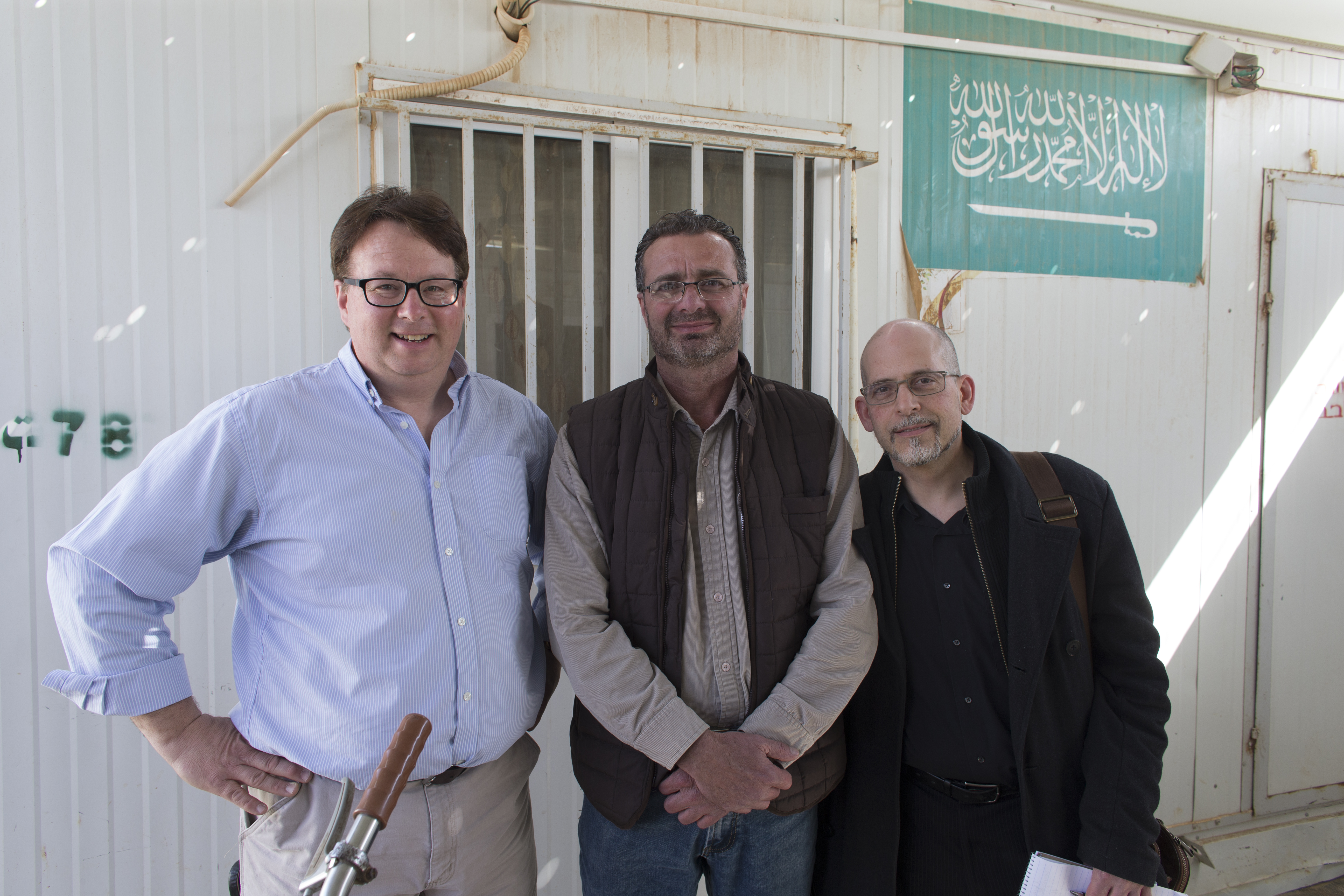
Education Resource
Meet the Journalist: Mark Hoffman
Milwaukee Journal Sentinel photojournalist Mark Hoffman talks about reporting on the work being done...
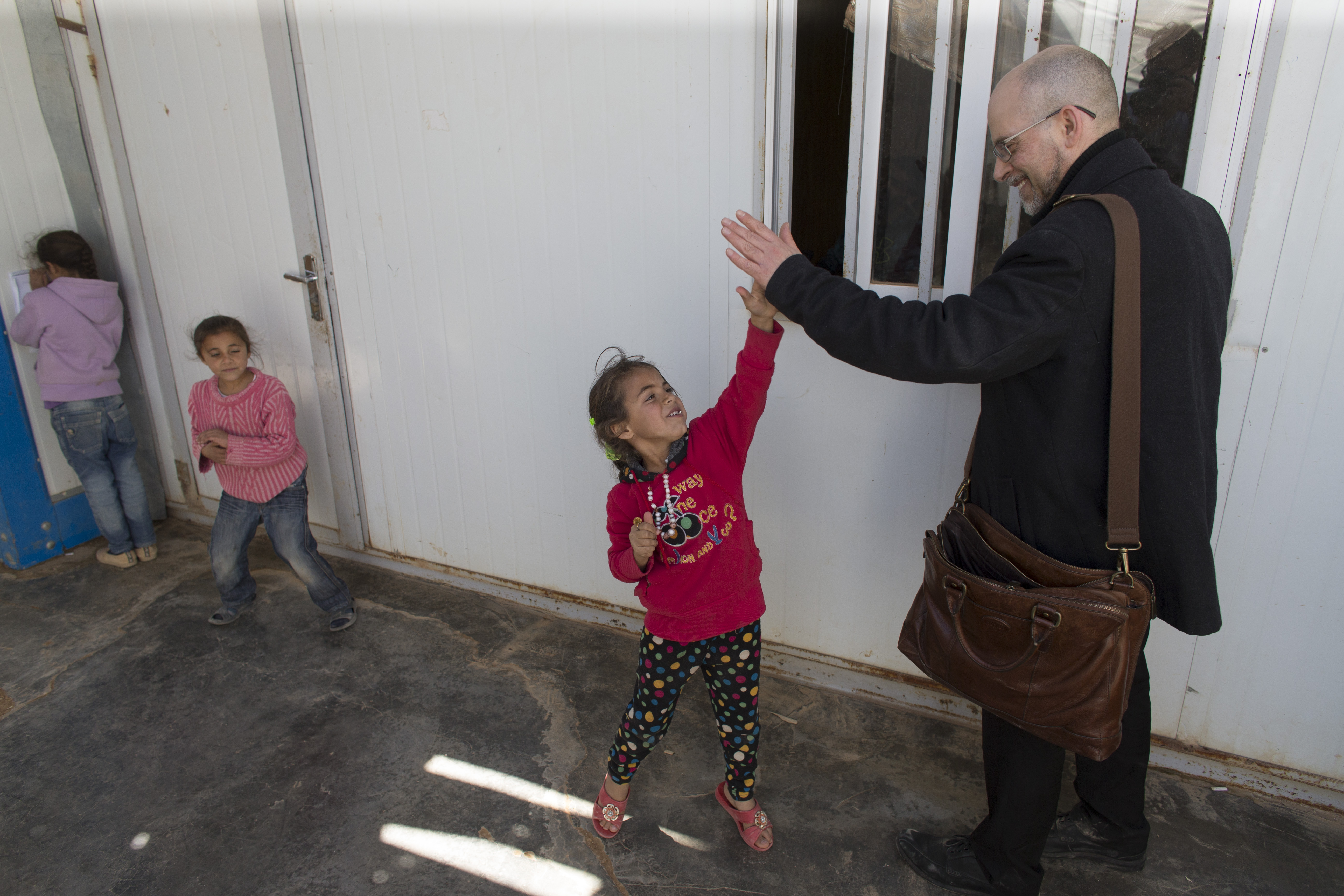
Education Resource
Meet the Journalist: Mark Johnson
Milwaukee Journal Sentinel reporter Mark Johnson discusses his reporting project, "The Healing," on...



